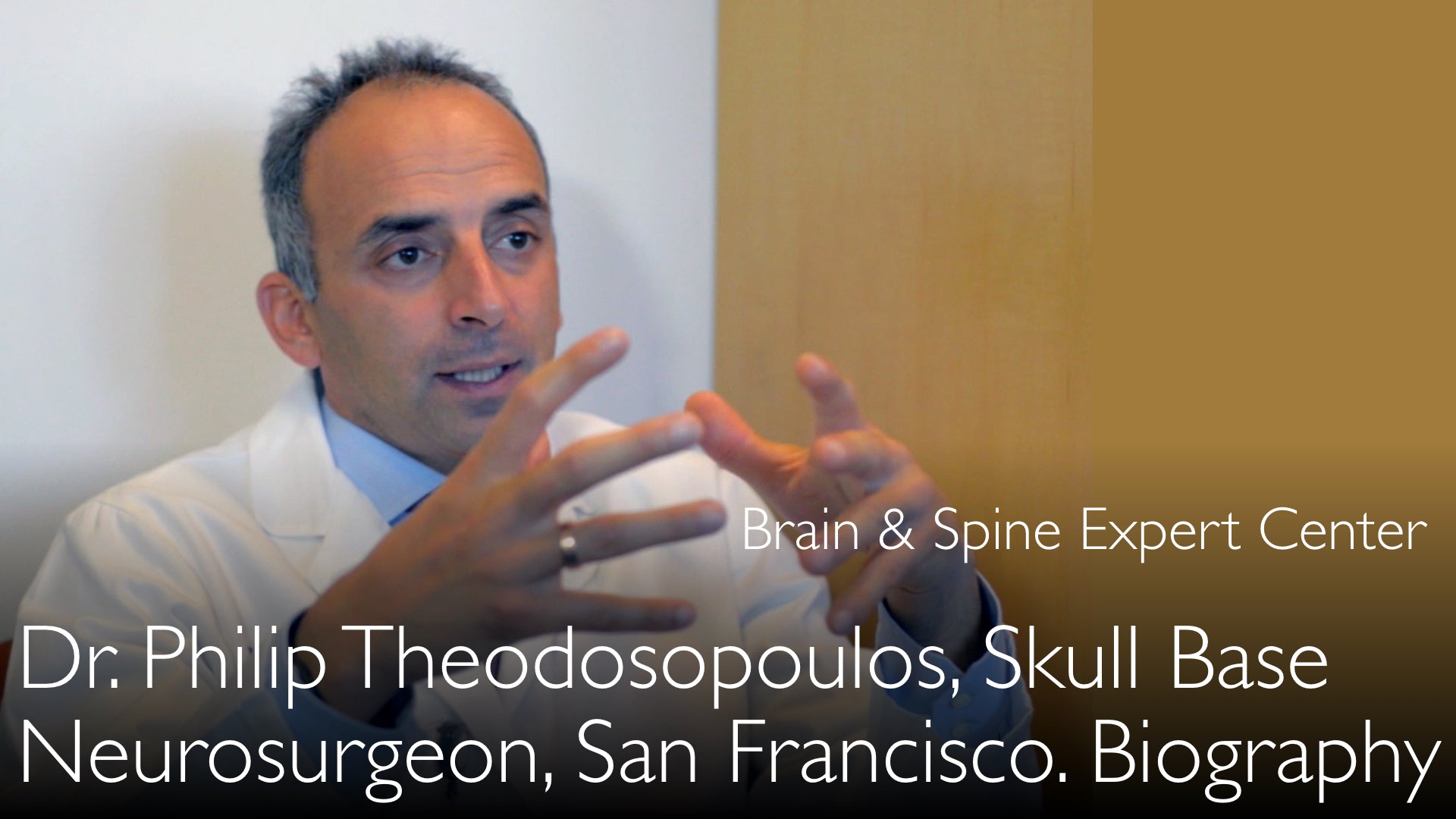O renomado especialista em cirurgia de tumores da base do crânio, Dr. Philip Theodosopoulos, MD, explica seu trabalho pioneiro em neurocirurgia minimamente invasiva. Ele lidera o Programa de Tumores da Base do Crânio da UCSF. Com vasta experiência em pesquisas sobre resultados clínicos e complicações cirúrgicas, o Dr. Theodosopoulos já desenvolveu mais de 50 cursos educacionais para neurocirurgiões em todo o mundo.
Abordagens Cirúrgicas Avançadas para Tumores da Base do Crânio e Neuromas do Acústico
Navegar para a Seção
- Formação do Especialista e Especialização Cirúrgica
- Liderança de um Programa de Excelência em Tumores da Base do Crânio
- Pesquisa Pioneira e Ensaios Clínicos em Neuroma do Acústico
- Inovações em Neurocirurgia Minimamente Invasiva
- Compromisso com os Resultados dos Pacientes e Análise de Desfechos Cirúrgicos
- Impacto Global no Ensino e Treinamento em Neurocirurgia
- Transcrição Completa
Formação do Especialista e Especialização Cirúrgica
O Dr. Philip Theodosopoulos, MD, é um neurocirurgião altamente especializado com uma carreira dedicada à cirurgia da base do crânio. Sua formação abrangente inclui residência em neurocirurgia na UCSF e um prestigioso fellowship em neurocirurgia cerebrovascular e da base do crânio no Brigham and Women's Hospital de Harvard, sob a orientação do Dr. Arthur L. Day. Essa base de treinamento de elite o preparou para uma carreira focada em procedimentos cranianos complexos.
Liderança de um Programa de Excelência em Tumores da Base do Crânio
O Dr. Philip Theodosopoulos, MD, atualmente dirige o Programa de Tumores da Base do Crânio na Universidade da Califórnia em San Francisco. Ele também ocupa os cargos de Professor e Vice-Presidente de Neurocirurgia nessa instituição de renome mundial. Antes de ingressar na UCSF, o Dr. Theodosopoulos passou uma década na Universidade de Cincinnati, onde liderou o Programa de Residência em Neurocirurgia e o programa de Cirurgia da Base do Crânio, demonstrando sua capacidade de liderança na neurocirurgia acadêmica.
Pesquisa Pioneira e Ensaios Clínicos em Neuroma do Acústico
O Dr. Philip Theodosopoulos, MD, tem como principal interesse clínico o tratamento de lesões da base do crânio, com expertise especial em neuromas do acústico, também conhecidos como schwannomas vestibulares. Sua liderança em pesquisa é evidenciada por seu papel como co-investigador principal do maior ensaio clínico já realizado sobre o tratamento cirúrgico de neuromas do acústico. Esse compromisso com o avanço da área é reforçado por sua atuação no conselho consultivo médico da Acoustic Neuroma Association, onde contribui para orientar os padrões de cuidado ao paciente.
Inovações em Neurocirurgia Minimamente Invasiva
Um dos focos centrais do Dr. Theodosopoulos é o desenvolvimento e a implementação de técnicas neurocirúrgicas minimamente invasivas para o tratamento de tumores da base do crânio. Reconhecido como pioneiro na criação de novas abordagens cirúrgicas, ele prioriza a segurança e a recuperação do paciente. Essas técnicas avançadas frequentemente resultam em incisões menores, menor dano tecidual e melhores desfechos pós-operatórios para pacientes submetidos a cirurgias complexas de tumores cerebrais.
Compromisso com os Resultados dos Pacientes e Análise de Desfechos Cirúrgicos
O Dr. Philip Theodosopoulos, MD, possui formação formal em pesquisa de desfechos e epidemiologia clínica, que aplica diretamente em sua prática. Ele lidera continuamente iniciativas de pesquisa focadas em complicações cirúrgicas e resultados do tratamento, garantindo que suas técnicas sejam eficazes e seguras. Essa abordagem baseada em dados permite que o Dr. Theodosopoulos refine procedimentos e ofereça aos pacientes o mais alto padrão de cuidado baseado em evidências, fundamentado em análises rigorosas.
Impacto Global no Ensino e Treinamento em Neurocirurgia
Além de seus papéis clínicos e de pesquisa, o Dr. Theodosopoulos é um educador dedicado que impactou profundamente o treinamento neurocirúrgico mundial. Ele projetou e ministrou pessoalmente mais de 50 cursos educacionais nacionais e internacionais, compartilhando sua expertise em microcirurgia da base do crânio com colegas cirurgiões. Sua liderança educacional estende-se ao seu serviço no comitê de educação do Congresso de Cirurgiões Neurológicos, ajudando a moldar o futuro da especialidade. O Dr. Anton Titov, MD, destaca essas conquistas em sua discussão com o Dr. Philip Theodosopoulos, MD, neurocirurgião.
Transcrição Completa
Dr. Anton Titov, MD: Bom dia de San Francisco, Califórnia. Hoje estamos com o Dr. Philip Theodosopoulos, MD. Ele é Diretor do Programa de Tumores da Base do Crânio, Professor e Vice-Presidente de Neurocirurgia na Universidade da Califórnia em San Francisco, UCSF.
O Dr. Philip Theodosopoulos, MD, veio para a UCSF da Universidade de Cincinnati, onde foi Diretor do Programa de Residência em Neurocirurgia e Diretor do programa de Cirurgia da Base do Crânio por 10 anos.
Nascido em Thessaloniki, Grécia, o Dr. Theodosopoulos realizou seus estudos de graduação no MIT e obteve seu título de Doutor em Medicina na Universidade de Stanford.
Ele completou seu treinamento em neurocirurgia na UCSF e um fellowship em neurocirurgia cerebrovascular e da base do crânio no Brigham and Women's Hospital de Harvard em Boston, sob a direção do Dr. Arthur L. Day.
O interesse clínico primário do Dr. Theodosopoulos envolve o tratamento de lesões da base do crânio, particularmente neuromas do acústico e tumores malignos. Ele também se dedica ao tratamento neurocirúrgico minimamente invasivo da base do crânio.
Como pioneiro em novas abordagens cirúrgicas para o tratamento de tumores da base do crânio, o Dr. Theodosopoulos atuou como co-investigador principal do maior ensaio clínico de tratamento cirúrgico para neuromas do acústico.
Ele integra o conselho consultivo médico da Acoustic Neuroma Association e possui extensa expertise em pesquisa sobre resultados dos pacientes.
Com formação formal em pesquisa de desfechos e epidemiologia clínica, o Dr. Theodosopoulos continua a liderar pesquisas sobre complicações cirúrgicas e resultados do tratamento.
Ele projetou e ministrou mais de 50 cursos educacionais nacionais e internacionais em neurocirurgia e publicou mais de 100 artigos de pesquisa e clínicos sobre tratamento de tumores cerebrais, microanatomia neurocirúrgica, resultados de operações e análise de complicações em neurocirurgia.
O Dr. Theodosopoulos também serve no comitê de educação do Congresso de Cirurgiões Neurológicos.
Dr. Anton Titov, MD: Philip, obrigado, e bem-vindo!
Dr. Philip Theodosopoulos, MD: Obrigado, Anton.





